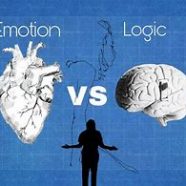
Brand marketing is all about making a promise that will excite an audience and ultimately establish a bond with them. Exactly what and how you communicate such a proposition requires a thorough understanding of your target’s needs, desires and values. Related to this, creativity is essential for finding that passionate “sweet spot” to emotionally connect with him/her. In other words, detached objectivity and a rational persuasion are not enough; emotional feelings are needed to guide reason and cognitive thinking for optimal decision-making.
Importance of Emotions in Neuroscience
Neuroscientists have studied the role of emotions over the past 30 years and have concluded that emotions have the greatest impact on behavior and decision-making. They found that the brain has three sections (i.e. the “Triune Brain Model”). The Limbic or mid-section is the unconscious or emotional part that receives millions of pieces of information each second through our five senses, whereas the conscious section processes only 40 pieces per second.
A famous neuroscientist, Antonio Damasio published his classic book, “Descartes’ Error” in 1994, which concluded that “over 80% of the thought, emotions and learning occurs in the unconscious mind”. Another reputable neuroscientist, John Caine, said in 2000 that “the essential difference between emotion and reason is that emotion leads to action while reason leads to conclusions”.
What Emotions Mean for Behavior
In August, David Brooks of the NY Times wrote a widely acclaimed article, “You’re Only as Smart as Your Emotions”, where he concluded that the recent understanding of emotions represented one of the major intellectual breakthroughs of the last half century. He described likely implications of certain emotions and how they “slant the mind in one direction or another depending on circumstances”. For example:
- Indignation – helps us focus on injustice
- Awe – motivates us to feel small in the presence of grandeur and to be good to others
- Euphoria – puts us in a risk-taking frame of mind
- Happiness – makes people more creative, more flexible in their thinking
- Disgust – primes us to reject immoral behavior
- Fear – helps amplify our senses and focus attention
- Anxiety – puts us in a pessimistic state of mind, less likely to take chances
- Sadness – improves memory, helps us make more accurate judgments, makes us clearer communicators and more attentive to fairness.
It may seem obvious that one’s feelings or emotional state of mind is essential for successful human connections, but these recent neuroscience discoveries demonstrate that emotions are also central to being an effective rational person. The main point of Brooks’ article is that one needs to be “ardent enough to feel and astute enough to understand your feelings”, or in general have the emotional self-awareness to make great decisions. In short, making intelligent decisions often means listening to your gut or heart.
From a marketing perspective, searching for that ideal “sweet spot” or an “Aha!!” emotional reaction in research that could excite a consumer is critical for developing a compelling brand positioning. Brooks discusses the implications of emotional characteristics for politics too, since being president is all about making decisions. After observing campaign rallies for Harris and Trump, he described the stark difference in their emotional profiles (later corroborated in the presidential debate):
- “Kamala Harris was exuberant, joyful, a volcano of positive emotions“ – while some voters may still have questions on her vision for the future, the “happy” and “euphoric” feelings she conveyed may persuade independents to be more flexible and take a risk on her behalf.
- “Trump was combative, embattled, indignant, a volcano of negative emotions – even when talking about how much his crowds love him” – his MAGA followers and extreme conservatives may view this emotional profile as a sign of strength, but swing voters and moderate Republicans could feel “anxious” and “disgusted”, fearing that chaos would follow.
We will see how these contrasting emotional styles play out in the November elections.



Very interesting Jay. Thanks for the insights.